A Journey Through Rome’s Timeless Legacy
Discover the hidden histories, legends, and fascinating origins carved into Rome’s travertine stones. “Stone Stories” unearths the tales behind Rome’s landmarks, the enduring allure of travertine, and the ways these ancient stones continue to shape the city’s identity today. Journey with us to understand the timeless heritage beneath your feet.
-

How Much Would It Cost to Rebuild the Colosseum Today?
And what its cost tells us about Rome and memory Imagine walking through the Roman Forum. You come upon a new Colosseum, not a ruin, but a living, roaring amphitheater, fully rebuilt. What would it cost, in today’s world, to raise it again, block by block, arch by arch? According to a recent estimate from…
-

“Damnatio memoriae”: A Modern Label for an Ancient Practice
When Rome Tried to Forget Its Own Emperor There’s something deeply human about wanting to erase what embarrasses us.But the Romans, as usual, took this to another level. When Emperor Nero died in 68 AD, Rome didn’t just move on — it tried to wipe him from memory. Statues were smashed, inscriptions chiseled out, portraits…
-

Damnatio memoriae — How Rome tried to make Nero vanish, and what the stone still remembers
When forgetting was a political tool Damnatio memoriae is the modern name scholars use for a set of Roman practices by which a disgraced person — often an emperor or powerful official — had their memory publicly attacked: images smashed or re-worked, inscriptions chiselled or letters knocked out, and property seized. It was not a…
-

The Death of Pope Francis: Facts and Curiosities
On April 21, 2025, Pope Francis passed away at the age of 88 following a stroke, marking the end of a 12-year pontificate. His death initiated a series of traditional rituals, some of which he had personally asked to be simplified. 🕯️ The Rituals After a Pope’s Death 1. Confirmation of Death The Pope’s death…
-

In Vino Veritas: The Origins of the Ancient Saying 🍷
What Does “In Vino Veritas” Mean? “In vino veritas” — in wine, there is truth — is a proverb known all over the world, often used to hint that people reveal their true feelings after a few glasses of wine.But where does it actually come from? Greek Roots: A Double Decision The expression is rooted…
-

⚔️ Brother vs Brother: Why Did Romulus Kill Remus?
The founding of Rome is not just a tale of triumph, it begins with fratricide, the tragic killing of Remus by his twin brother Romulus. But why would the founder of one of the world’s greatest cities start with such violence? Let’s unpack the legend, the symbolism, and the different versions of this ancient Roman…
-

🎉 Natale di Roma: Why April 21st Is the Eternal City’s Birthday
Every year on April 21st, Rome celebrates its own birthday. An ancient tradition known as the Natale di Roma. But why this date? What makes it so special, and how did it come to represent the founding of one of the most influential cities in human history? Let’s dive into the legends, the facts, and…
-

The Endless Flow: Why Rome Is Home to So Many Fountains (Nasoni)
Rome is a city where water flows like history. Unceasingly, gracefully, and with a purpose. As you stroll through its streets, the abundance of fountains, affectionately known as “nasoni” (big noses), stands out. These water sources not only refresh the city but also serve as living testaments to Rome’s ingenious engineering and cultural heritage. The…
-

The Oldest Souvenir Markets of Rome: Where It All Began
Rome is not only the Eternal City for its iconic monuments and rich history, it’s also the birthplace of the souvenir tradition. Long before modern gift shops and online stores, ancient and medieval markets and historic shops in Rome offered travellers tangible memories of their journeys. Today, these traditions live on in the unique souvenirs…
-

SPQR: 4 letters for 3 meaningful words emblem of Roman Identity
Although SPQR is a four-letter acronym, it actually represents three fundamental words: “Senatus,” “Populus,” and “Romanus.” The extra letter “Q” stands for the conjunction “que,” meaning “and,” which elegantly connects the Senate and the People as the dual pillars of Roman power. This compact abbreviation encapsulates the unity and collective strength of ancient Rome.Let’s break…
-

Why Tivoli Was a Fundamental Stop on the Grand Tour
Tivoli, with its enchanting landscapes and historic villas, became an essential destination on the Grand Tour. This charming town, just a short distance from Rome, offered travelers a perfect blend of art, nature, and history—elements that resonated deeply with those seeking cultural enlightenment during their journey. A Journey Through History and Nature Tivoli is home…
-

The Grand Tour and the Birth of Modern Souvenirs
The Grand Tour, a rite of passage for European aristocrats in the 17th and 18th centuries, not only transformed travel but also laid the groundwork for the modern souvenir industry. As young nobles journeyed through Europe, with Rome often serving as the crown jewel of their itinerary, they began to collect mementos that would remind…


